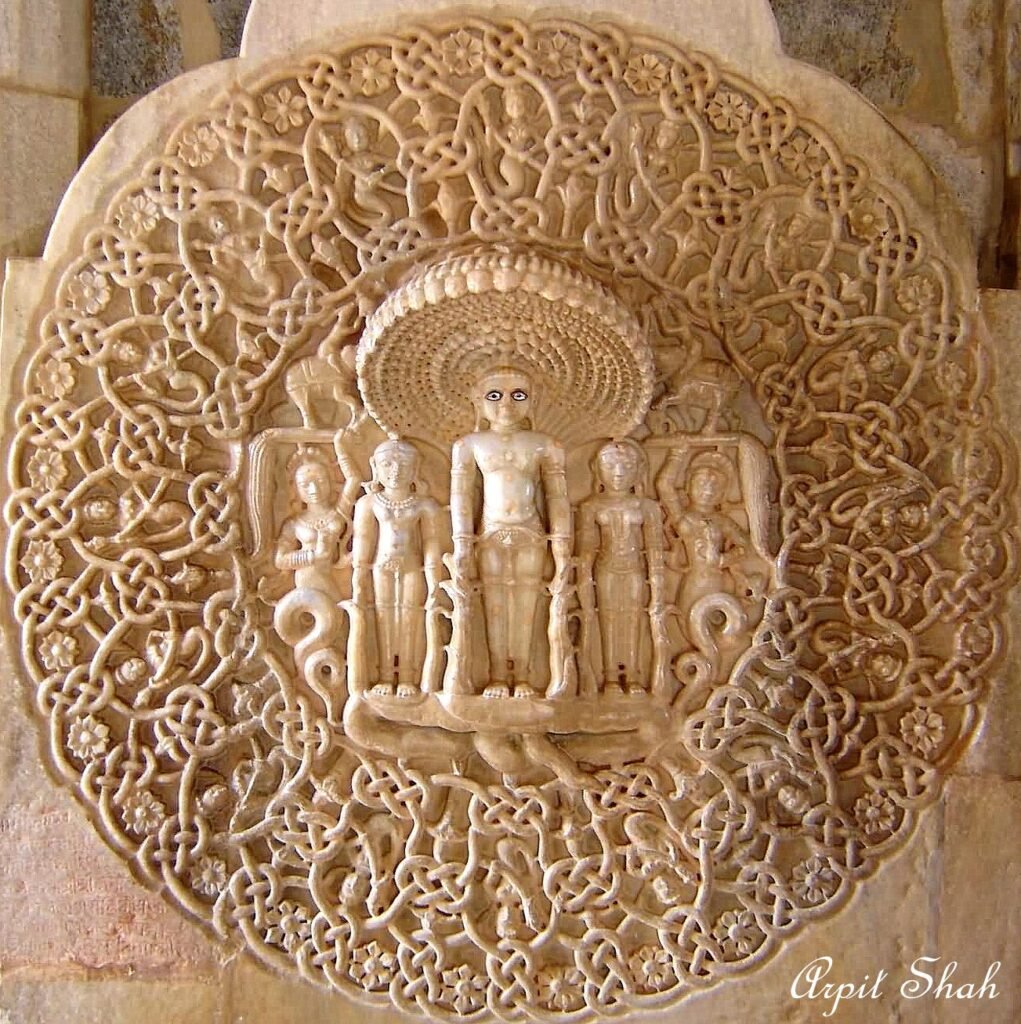In today’s fast-paced world, the relevance of Jainism and its Shramana roots is often overlooked, yet its teachings hold profound insights for contemporary society. This ancient philosophy offers guidance in areas such as historical understanding, scientific exploration, philosophical debate, psychological evolution, and inter-religious connections.
Historic Relevance of Jainism

The historical veracity of Parshva and Mahavira, dating back to 877 BCE and 497 BCE, necessitates a reassessment of our understanding of ancient Indian history. This established timeline for the 23rd and 24th Tirthankaras challenges the prevailing notion of our historical knowledge as definitive and complete.
The Jain canon, which accurately details the lives of Parshva and Mahavira, provides a compelling framework for exploring the existence of the preceding 22 Tirthankaras. The accuracy of the later figures logically implies the plausibility of earlier ones. This discrepancy highlights the limitations of current historical methodologies and underscores the need for more extensive and rigorous investigations.
Jain texts can serve as invaluable guides in this pursuit. Their detailed accounts, including geographical locations and temporal frameworks, offer valuable clues and potential avenues for archaeological and historical research. By utilizing these ancient records as indicators, historians can refine their search for evidence and potentially uncover a richer and more nuanced understanding of India’s past.
Scientific Relevance of Jainism

The scientific pronouncements within Jain cosmology exhibit a remarkable degree of sophistication, predating many modern scientific discoveries.
- Sentience in Nature: The Jain concept of plant sentience, aligns with emerging research in plant neurobiology, suggesting a more nuanced understanding of plant intelligence.
- Microbial Existence: The recognition of microorganisms within the Jain tradition predates their formal scientific discovery by centuries, highlighting an early awareness of the unseen world.
- Evolutionary Principles: Jain philosophy, with its emphasis on cyclical transformations and the interconnectedness of all beings, exhibits conceptual parallels to the theory of evolution.
- Fundamental Forces: The concept of “Pud-Gal” (matter) undergoing “Pud” (fusion) and “Gal” (fission) resonates with the modern understanding of nuclear reactions and the fundamental forces governing the universe.
- Gravity and Dark Matter: The recognition of “Adharma Dravya” (gravity) and “Dharma Dravya” (dark matter) as integral components of the universe predates their formal scientific discovery by over two millennia.
- Universal Dynamics: Jain cosmology posits the universe (“Lokakash”) as a dynamic interplay between matter, gravity, and dark matter, a concept that aligns with contemporary cosmological models.
- Infinite Space: The concept of “Alokakash” (endless space) aligns with modern cosmological theories that suggest the universe may be spatially infinite.
Furthermore, Jain texts present intriguing hypotheses that warrant further scientific exploration:
- Cosmic Structure: The notion of a revolving universe with galaxies orbiting a central axis (“Mt. Meru”) anticipates modern cosmological models of galactic rotation and cosmic structures.
- Multiverse Theory: The concept of “Dvipas” (parallel universes) resonates with contemporary theories of the multiverse, suggesting a complex interconnectedness of realities.
- Extraterrestrial Life: Jain cosmology not only talks about various regions and planes where extra terrestial life exists, but also marks directions and their precise location in our universe.
These examples demonstrate the potential of Jain annals to serve as a valuable resource for scientific inquiry. By critically examining these ancient texts and subjecting their assertions to rigorous scientific scrutiny, we may unlock profound insights into the fundamental nature of reality.
These examples demonstrate the potential of Jain cosmology to serve as a valuable resource for scientific inquiry. By critically examining these ancient texts and subjecting their assertions to rigorous scientific scrutiny, we may unlock profound insights into the fundamental nature of reality.
Philosophical Relevance of Jainism

Jain philosophy stands as a unique and compelling system of thought, characterized by its rigorous internal consistency and it’s emphasis on individual agency.
- Logical Foundation: Jainism, with its core principle of “Anekantavada” (the principle of multiple perspectives), emphasizes the multifaceted nature of reality and encourages a nuanced and critical examination of all truths. This approach fosters intellectual humility and discourages dogmatic assertions.
- Emphasis on Individual Agency: The doctrine of karma, central to Jain thought, places the onus of individual liberation squarely on the shoulders of the individual. It posits that human actions, thoughts, and intentions directly shape their future experiences, thereby empowering individuals to be the architects of their own destinies.
- Non-Theistic Framework: Jainism, while acknowledging the existence of enlightened beings (Tirthankaras), does not posit a creator god. This non-theistic framework emphasizes self-reliance and encourages individuals to take responsibility for their own spiritual growth.
These core tenets of Jain philosophy offer a compelling framework for ethical living and personal development, emphasizing individual responsibility, critical inquiry, and the pursuit of inner peace through virtuous conduct.
Psychological Relevance of Jainism

Jain philosophy offers a profound framework for understanding human psychological development.
- The Evolution of Compassion: Jainism posits that human beings progress through stages of moral development, moving from a state of self-absorption and lack of empathy for other sentient beings towards a state of profound compassion and non-violence. This concept resonates with contemporary psychological models of moral development, which emphasize the gradual acquisition of empathy, altruism, and ethical reasoning.
- Layers of Consciousness: Jain thought anticipates modern psychological concepts such as the conscious, subconscious, and unconscious mind. It further postulates the existence of deeper layers of consciousness, suggesting a more nuanced understanding of the human psyche than currently prevalent in mainstream psychology.
- The Transcendence of Mind: Jainism explores the ultimate goal of spiritual liberation, which involves the transcendence of the limitations of the mind. This concept, while challenging to empirically investigate, raises profound questions about the nature of consciousness and the potential for human experience beyond the confines of ordinary mental states.
Jain philosophy, with its emphasis on introspection, self-awareness, and the cultivation of inner peace, offers a rich tapestry of insights that continue to resonate with contemporary psychological thought.
Religious Relevance of Jainism

Jainism, with its ancient origins, has exerted a profound influence on the development of other major religious traditions, both within the Dharmic and Abrahamic spheres.
- Shared Concepts: Key concepts such as non-violence (Ahimsa), liberation (Moksha), spiritual discipline (Tapas), the law of karma, and meditative practices are central to Jainism and have found resonance in Hinduism, Buddhism, Sikhism, and even within certain strands of Abrahamic thought.
- Historical Parallels: Jain texts describe a primordial era of idyllic existence, reminiscent of the Garden of Eden in Abrahamic traditions. Notably, the first human leader in this idyllic period is referred to as “King Nabhi,” a name that bears striking resemblance to “Nabi Adam,” the first human in Abrahamic narratives.
- Theological Similarities:
- The Jain concept of the soul’s divinity finds parallels in the Judeo-Christian notion of the “Nefesh Elohim” (divine soul) and its entrapment within the material world (“Nefesh HaBehamit”).
- The Christian concept of God as Father and Son resonates with the Jain understanding of Siddhas (the liberated ones) and Arihanta (The Enlightened Ones).
- The Christian concept of divinization, or the process of becoming like God, exhibits remarkable parallels with the Jain concept of “Guna-Sthana,” the stages of spiritual progression towards enlightenment. Enclosed below are images that explain the process of divinization in the two religions and similarities would not be hard to point.


These remarkable similarities suggest a deeper interconnectedness between seemingly disparate religious traditions. By studying Jainism, we can gain valuable insights into the shared roots and underlying principles that unite humanity’s spiritual quest. Such comparative study can foster greater interfaith understanding and contribute to the resolution of religious conflicts.
Conclusion
As we navigate modern challenges, the relevance of Jainism in our daily lives is more crucial than ever. Its insights into our history, science, philosophy, psychology, and faith provide a comprehensive framework for personal growth and societal harmony. Embracing these teachings enables us to foster a deeper understanding of ourselves and our place in the universe.
